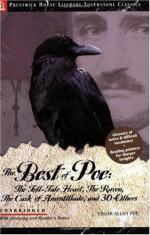|
This section contains 4,696 words (approx. 16 pages at 300 words per page) |

|
SOURCE: Poe, Edgar Allan. “The Philosophy of Composition.” In Literary Criticism of Edgar Allan Poe, edited by Robert L. Hough, pp. 20-32. Lincoln, Neb.: University of Nebraska Press, 1965.
In the following essay, which is believed to have been originally delivered as a lecture by Poe in 1845, the poet discusses the process of composition that resulted in “The Raven.”
Charles Dickens, in a note now lying before me, alluding to an examination I once made of the mechanism of “Barnaby Rudge,” says—“By the way, are you aware that Godwin wrote his ‘Caleb Williams’ backwards?1 He first involved his hero in a web of difficulties, forming the second volume, and then, for the first, cast about him for some mode of accounting for what had been done.”
I cannot think this the precise mode of procedure on the part of Godwin—and indeed what he himself acknowledges, is not...
|
This section contains 4,696 words (approx. 16 pages at 300 words per page) |

|


